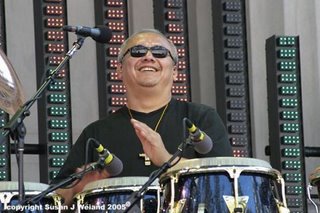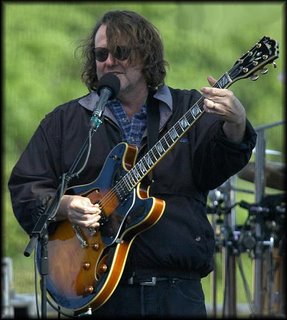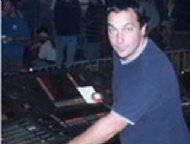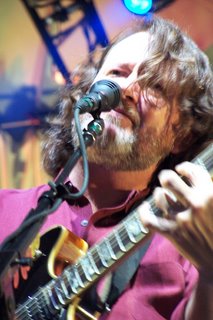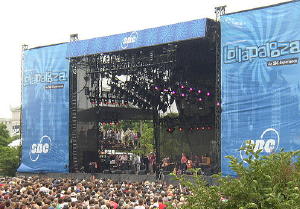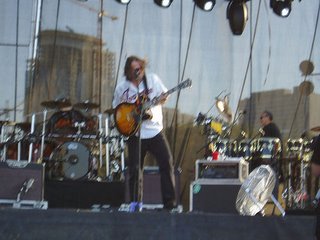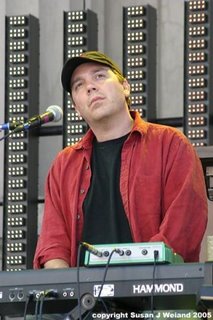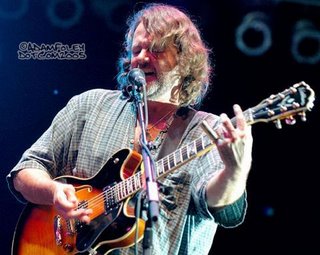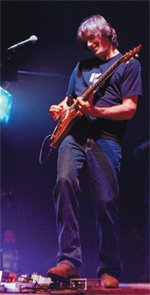
When I first saw JB's costume I thought it looked strangely a lot like
Dingle from the Adult Teen Hungry Force episode Escape From Leprauchpolis.
Dingle, the red-headed Leprechaun, was controling the rainbow machine!
Same socks, same red hair, same green coat, same ears.
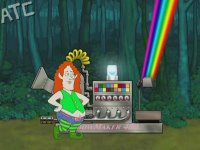
What do you think??
10/31/05 The Thomas and Mack Arena, Las Vegas, NV
1: Love Tractor > Imitation Leather Shoes, Born Under A Bad Sign, Time Zones, Papa Johnny Road, Vampire Blues*, Bayou Lena*, Old Neighborhood*, Weight Of The World*
2: Superstition**, Rebirtha > Climb To Safety > Monstrosity > Drums > Arleen* > Spirit In The Dark* > I Put A Spell On You* > Fishwater*
E: Dark End of the Street*, Nowhere To Run*, Coconut*
* with Dirty Dozen Brass Band
** with Dirty Dozen Brass Band, DJ Method on turntables
[Only 'Born Under A Bad Sign', First 'Dark End of the Street', Only 'I Put A Spell On You', Only 'Nowhere To Run', Only 'Spirit In The Dark', First 'Vampire Blues'; 'The Andy Griffith Show' and 'Dragnet' teases before 'Love Tractor'; 'Muffin Man' tease by Dave before 'Drums'; 'Good Morning Little Schoolgirl' and 'Ribs And Whiskey' raps by JB during 'Arleen']
source - everydaycompanion.com
SIDE NOTE: DJ Crystal Method opened and played during the setbreak.
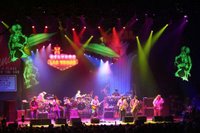
GLIDE MAGAZINE
Widespread Panic - Thomas & Mack Center, Las Vegas, NV - 10/31/2005
Brian Gearing
I don’t know if the bar in the foyer of the Bellagio has a dress code, but after almost sixty straight hours of music, shower or no shower, I’m sure I looked pretty ragged in a Guns ‘n’ Roses t-shirt and the same pair of jeans I’d been wearing since getting on the plane Friday. All things considered, I shouldn’t really blame the hostess for looking straight through me, but the tram ride through the desert pines to the lobby was the first chance I’d had all weekend to slow down and take a breath, and I wasn’t quite ready to start moving again just yet.
I ordered a bottle of water, took the brown paper bag from my pocket, and continued the scribbling that had started in the souvenir shop, where I’d asked the bewildered cashier, who barely spoke enough English to understand me, to borrow a pen. As the piano player flew through flurries of sixteenth and thirty-second notes, I spun myself around to admire the glass flowers on the ceiling and thought about chance. Las Vegas had had the best of it, and it just didn’t seem fair. “Something from New Orleans,” I wrote on the bag, then tore off a piece and placed it on the piano. After finishing the classical piece, he picked up the brown scrap, glanced over and nodded, and as the first soulful bars radiated like Delta heat from the baby grand, tears welled in my eyes.
Reminders of the Katrina tragedy had dotted the Vegoose landscape, where ReNew Orleans booths were set up here and there, but while hours of TV news coverage had left a permanent mark on all of America, the music lovers who had descended upon Las Vegas seemed to have decided that, for this weekend at least, it would be easier to just try and forget for a while. A place like Las Vegas makes forgetting easy, but Widespread Panic, who have planted so many roots in New Orleans, made it a point to remember this Halloween night.

After Crystal Method’s opening DJ set, Dave Schools teased a little bit of Halloween mayhem with the dark, foreboding Dragnet theme, but as drummer Todd Nance turned the key on the “Love Tractor” opener, any spooky vibes settled into the backbeat. Schools gave another fright as the bass line of “Imitation Leather Shoes” stomped like combat boots through Delta mud, reawakening a few sleeping beasts, but aside from the first ever “Born Under a Bad Sign” and Neil Young’s “Vampire Blues,” most of the show was standard, fright-free Panic.

When the Dirty Dozen Brass Band is in the house, however, standard Panic flies out the door. Together, the two bands are a different beast altogether. And though the horns add to the party spirit, they limit the band’s improvisational abilities, so especially in the first set, things stayed pretty simple. While the slow blues of “Born Under a Bad Sign” had hinted at a little Cajun flavor, full-brass versions of “Bayou Lena,” and “Old Neighborhood” piled it on, and when the set closed with “Weight of the World,” the evening’s theme was starting to become clear.
With the Crystal Method spinning during setbreak, most of the Halloween revelers kept their seats—or rather their places. Few were still sitting as the steady beat built to an irresistible groove through “Crosstown Traffic,” “Enter Sandman,” “Roadhouse Blues” and “Song 2” until the familiar funk of “Superstitious” signaled the band’s return with horns in tow. DJ Method stuck around to work the wax through the second set opener and received a riotous ovation as he and the Dirty Dozen left the stage to the headliners.

No longer burdened with taming the multi-headed brass beast, Widespread Panic was able to stretch their wings in the second set, starting with a funky “Rebirtha.” One of Panic’s stronger love songs, “Climb To Safety” lost some of its power when John Bell dropped the joyous chorus down an octave, but “Monstrosity” lived up to its name. Dave Schools and George McConnell shared driving duties, navigating the big, hairy Halloween beast up shadowy mountain curves before finally letting go of the wheel to let it barrel down the other side into the controlled chaos of Domingo Ortiz’s percussion solo.

As Todd Nance pulled Ortiz back from the brink, the rest of the band returned to the stage with the Dirty Dozen close behind. The horn section got comfortable and the crowd chanted along with the chorus, while John Bell rapped through “Arleen.” The song began to crumble, however, when aliens descended upon the stage, locking their death rays on the Las Vegas backdrop that suddenly illuminated the room. The slow, bluesy intro of “Spirit in the Dark” soon rose from the pile of sonic rubble before the true gospel soul lifted the whole sad scene above the destruction.
The voodoo blues of Screamin’ Jay Hawkins’ “I Put a Spell on You” resurrected the Halloween spirit, and a fitting “Fishwater” closer brought the party back to the French Quarter for “more, more, more.” Schools’s bass and JB’s growl brought the evening to a head, but all good things must end. A three-song encore delayed the inevitable, but after first-ever versions of the slow, mournful “Dark End of the Street” and the soulful “Nowhere to Run,” the calypso Panic party anthem “Coconuts” waved a final goodbye to a momentous weekend.

Like the song’s hints of suntan lotion and saltwater, however, the inaugural Vegoose weekend would linger in my consciousness for weeks, and the closing evening was the perfect ending to a perfect musical weekend. Since its reemergence from hiatus this spring, Widespread Panic has been firing on all cylinders, and this Halloween spectacle was no exception. Who better to remind us of the city we’ve almost lost than this Georgia band that’s made their second home there, and where better to remind us than this city that has given a temporary home to all our favorite things?
--------------------------------------------
--------------------------------------------
